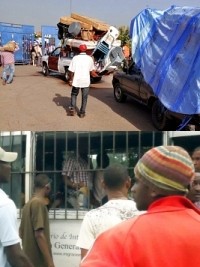|
||||||||||||||||||
|
|
Haiti - DR : The situation of returnees remains worrying 12/07/2016 11:02:36
Since the deadline to register under the national plan for regularization of foreigners (PNRE) of Dominican Republic ended in June 2015, many foreigners living in the country, especially thousands of Haitian and Dominicans of hatian decent found themselves in irregular situation and virtually with no rights. Immediately thousands of people started to arrive in Haiti, some through expulsion or deportation, others more or less on voluntary or spontaneous returns. Faced with this influx, the Government of Haiti, with the support of humanitarian partners, have developed an Inter-agency contingency plan in May 2015 to assist and support between 20,000 and 30,000 returned people. This plan helped meet the needs of first returned people by making available a small returning kit and a basic recording mechanism and support to arrive to their areas of origin. Immediately after the start of the arrivals from the Dominican Republic, six spontaneous sites were created nearby the town of Anse à Pitre. To address this situation, a CERF funding was provided by OCHA to IOM in order to relocate these people, in line with government policy aiming to not fix people in the sites. Between March and April 2016, some 2,200 returnees from the Dominican Republic, who lived in precarious conditions in six makeshift camps in Anse-à-Pitres have received assistance for their resettlement in areas of their choice https://www.haitilibre.com/en/news-17178-haiti-humanitarian-relocation-of-returnees-from-dr-is-underway.html . The relocated families have benefited from a financial support for renting a home of their choice for a year, provided that the home fits to the minimum standards established by IOM. A border monitoring began immediately after the start of the crisis under the leadership of IOM and with the financial support of OCHA and USAID. The data collected through this mechanism are the most reliable on this issue so far. But it is important to note that this mechanism only covers a portion of those arriving from the Dominican Republic because the interviews are made on a voluntary basis. Other actors such as “Groupe d’Appui aux Rapatriés et Réfugiés” (GARR) and the Jesuit Service for Migrants (SJM) complete the monitoring device and play an important role in the registration of returnees in several official and unofficial entry points at the border. In addition, the low capacity of state services at the border did not allow this monitoring work, which has been done for over a year by humanitarian actors, to be systematically integrated into national systems. In the second half of 2016 a significant number of Haitian nationals, who received a residence permit for one year under the National Regularization of Foreigners Plan (PNRE) will have their document expire, on July 18th. Human Rights organizations working on this problem estimate there are nearly 130,000 Haitian nationals who will be affected by the end of this permit, which increases the risks of a new wave of deportations, expulsions or spontaneous returns to Haiti https://www.haitilibre.com/en/news-17947-haiti-flash-140-000-haitians-facing-deportation-because-of-the-inaction-of-haiti.html . Haitian immigrants affected by this measure must have their situation regularized before that deadline. For that, it is necessary to present a series of official documents that are not always easy to get (for example temporary permit, criminal record, medical examination) and pay renewal fees (14,000 Pesos or 305 USD per person). See also : https://www.haitilibre.com/en/news-17990-haiti-flash-the-dominican-government-could-aid-the-haitians.html https://www.haitilibre.com/en/news-17989-haiti-dominican-republic-the-haitian-government-says-anything.html https://www.haitilibre.com/en/news-17947-haiti-flash-140-000-haitians-facing-deportation-because-of-the-inaction-of-haiti.html HL/ HaitiLibre
|
|
|
Why HaitiLibre ? |
Contact us |
Français
Copyright © 2010 - 2024 Haitilibre.com |



